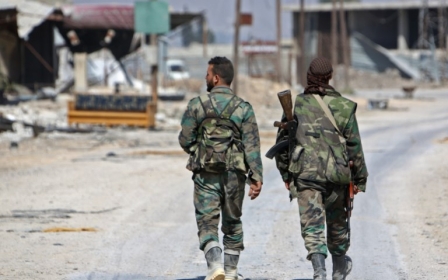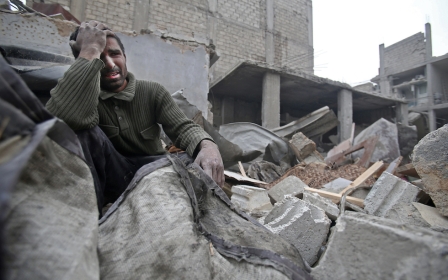Chemical weapons in Syria: A huge distraction from conventional war crimes

Diplomatic circles are once again abuzz with rumours regarding a possible US military intervention in Syria. But not to protect the civilians of Eastern Ghouta on the outskirts of Damascus, who have been under siege for years and who are being killed by the hundreds as distressing mainstream media images have recently shown.
Instead, the purported intervention would come in response to repeated allegations of chemical weapons being used in Ghouta, which the UN High Commissioner of Human Rights says killed two children in 2018. This alone raises a number of questions concerning the manipulation of the issue of chemical weapons in the Syrian conflict for political and diplomatic ends.
A turning point
Though their impact is certainly negligible in military and strategic terms, as well as in the balance of opposing forces, the use of such weapons reverberates around the world and makes substantial political waves, constituting what amounts to a de facto front separating the United States, Russia and the rest of the international community.
As such, all of the actors involved in the Syrian conflict are trying to spin the question of chemical weapons to promote their own interests.
Among them, the commission substantiated the use of chemical weapons, formally prohibited by international humanitarian law, echoing dozens of allegations made not only against the Syrian government but also against jihadist groups, armed opposition groups, and the Islamic State (IS).
The Syrian government, Russia and Iran have thus succeeded in forcing the West to accept the continued use of so-called "conventional" military weapons and tactics - which are much more deadly and just as illegal under international law
The chemical attack on Ghouta in August 2013, which killed more than 1300 people, would mark a turning point in the conflict. At this point Russia began initiated a series of moves - well before its military intervention two years later- that would turn the struggle in favour of the Syrian government, though Assad had clearly crossed the "red line" set down by President Barack Obama a year before.
Heated diplomatic discussions
By not following through on his threat to take military action against Assad, Obama handed off the diplomatic resolution of the crisis to Moscow.
In the aftermath of the August 2013 chemical attacks, Russia's Foreign Minister Sergei Lavrov made an offer to his then US counterpart, Secretary of State John Kerry, that Syria would agree to dismantle its stockpile of chemical weapons under the supervision of Organisation for the Prohibition of Chemical Weapons (OPCW), allowing the Syrian government to establish itself as a legitimate partner for talks and negotiations.
The "deal" started a round of heated diplomatic discussions within the United Nations on issues of chemical weapons. Following the negotiations, and Syria's signing and subsequent ratification the Chemical Weapons Convention, the Security Council adopted the Joint Investigative Mechanism (JIM) in August 2015.A final JIM report, with conclusions rejected by Russia condemning the Syrian regime, would be released in late 2017, bringing to a close the series of delaying tactics that had only served to dilute the question of the protection of Syrian civilians in cynical technocratic debate.
Russia, backed by its international allies, has since dominated the negotiation process, making use of its veto left, right and centre to protect the Assad regime while repeatedly avowing to support the principle of banning the use of chemical substances in armed conflicts.
The humanitarian issues have been relegated to the background and international humanitarian law violations have become more ruthless and more routine
The tactic has turned out to be highly effective in that it has pushed international teams on the ground in Syria to focus their diplomatic efforts on proving the use of chemical weapons.
Conventional crimes
The Syrian government, Russia and Iran have thus succeeded in forcing governments in the West to accept the continued use of so-called "conventional" military weapons and tactics -which are much more deadly and just as illegal under international law.
As a result, humanitarian issues have been relegated to the background and international humanitarian law violations have become more ruthless and more routine, like the on-going barbaric sieges on civilian populations and the destruction of hospitals and schools in territories beyond the government's control: Homs in 2014, Daraya and Aleppo in 2016, and now Ghouta, on the outskirts of Damascus.
A sort of collective amnesia – and an unbearable sense of helplessness – appears to have gradually taken hold of governments everywhere, in the face of the acceleration of the suffering of Syrian populations.
Discrediting adversaries
Politically and diplomatically, these non-conventional attacks have served the Syrian regime and its Russian and Iranian allies in that they emphasise the ineffectiveness of US and European "red line" rhetoric while monopolising the diplomatic efforts of powers opposed to the Assad government - in particular the United States, France, Great Britain, and Turkey - to the detriment of other issues.
The issue of chemical weapons is also used to discredit adversaries. Iran, Russia and Syria recently accused Turkey of having used chemical weapons in an offensive on the enclave of Afrin, for example. The Syrian ambassador in New York also regularly accuses armed opposition groups of fomenting alleged attacks in order to trigger foreign interventions.
Foreign powers involved in combating the Assad regime seem content with mere condemnations and the occasional reprisal – like the one-off US cruise missile strike of April 2017 after the chemical attack on Khan Sheikhun in Idlib province - aimed at pressuring Russia, Iran and the Syrian government but without making any real political commitments to bring the war in Syria to an end.Exiled Syrian opposition groups are also trying to get leverage from the issue of chemical weapons in order to bring about a regime change. By focusing solely on the question, the Syrian Committee for Negotiations in charge of UN-supervised negotiations with the Syrian government in Geneva ended up putting aside a number of critical political issues in the effort to come up with "transition" policies for Syria.
Why have issues of chemical weapons in Syria so completely overshadowed the use of all forms of so-called conventional weapons, including the far more deadly air strikes on civilian neighbourhoods?
One answer could be that the Assad regime makes use of conventional weapons when it wants to demonstrate its military strength and its determination to win the war. But by using chemical weapons, the regime is showing Syrian populations, and the international community, that it is equally determined to win the peace.
The regime alone will decide the political fate of the country; nobody is coming to save the people from the reign of what researcher Michel Seurat prophetically called "the state of barbarism".
Diplomatic parleying over issues of chemical weapons weakens international law and ultimately far exceeds the Syrian crisis.
The chemical weapons question not only symbolises the constant crossing of the "red line". It is both the symbol and the driving force of the growing relativism with which the rules of international human rights and humanitarian law are regarded, giving the state of barbarism a rightful place in the international arena.
Constantly and openly flouted international humanitarian law is greatly weakened by the growing gap between conventional "rules of war" and those of wars like the one in Syria - a reality foreshadowing unprecedented levels of suffering in Syria but also more ruthless and deadly conflicts to come.
- Lorenzo Trombetta is a journalist and a researcher of contemporary Syria. He has been living in the Middle East for 20years and has written numerous books and essays on the history of Syria. You can follow him on Twitter: @TrombettaLorenz
The views expressed in this article are the author’s own and do not necessarily reflect the editorial policy of Middle East Eye.
This story originally appeared in the MEE French edition and was translated by Heather Allen.
Photo: A Syrian child being carried to shelter after a chemical attack on the Syrian village of Khan Sheikhun (Reuters).
Stay informed with MEE's newsletters
Sign up to get the latest alerts, insights and analysis, starting with Turkey Unpacked
Middle East Eye delivers independent and unrivalled coverage and analysis of the Middle East, North Africa and beyond. To learn more about republishing this content and the associated fees, please fill out this form. More about MEE can be found here.








